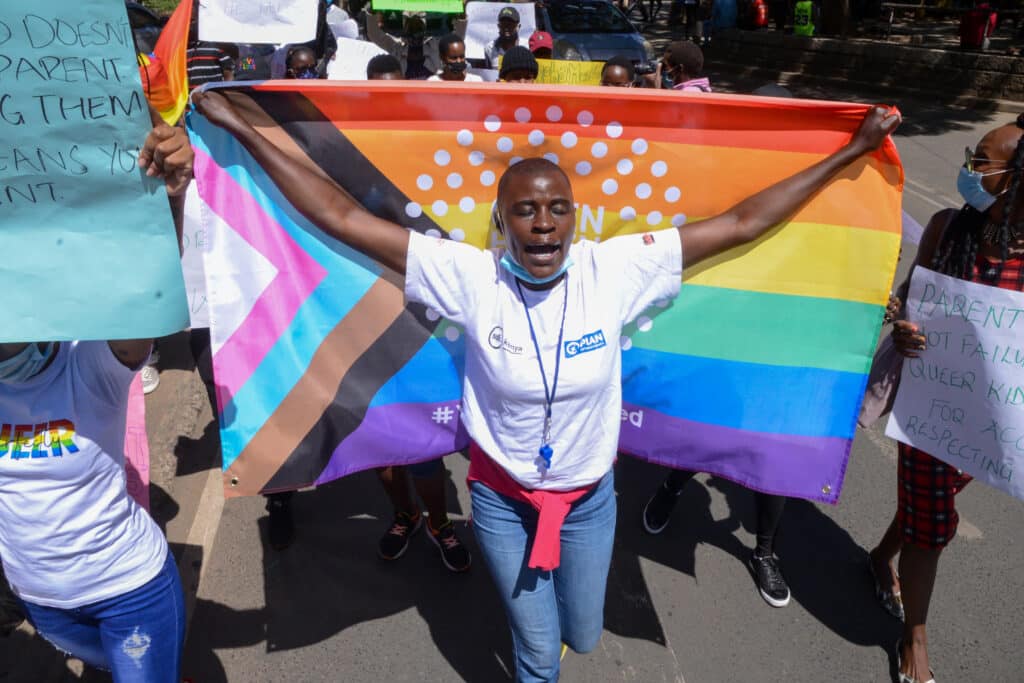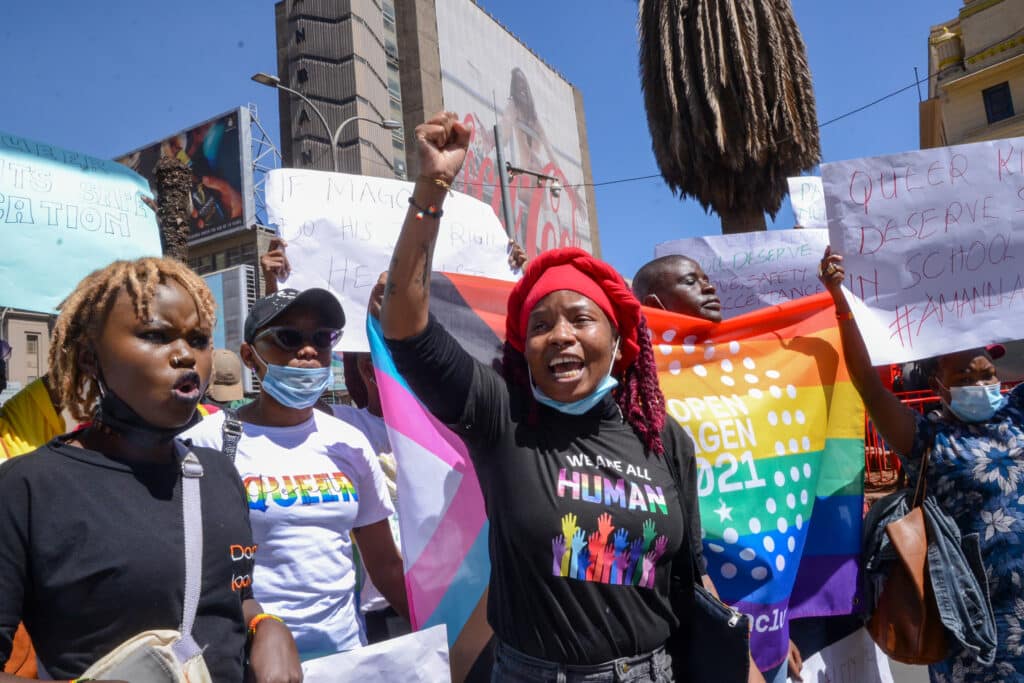LGBTQ+ Ghanaians fight back against arbitrary arrests and bigotry: ‘We want justice’
Arbitrary arrests, blatant bigotry and unlawful detentions are an everyday occurrence for LGBTQ+ people in Ghana – but activists are fighting back.

On 20 May, 2021, Ghanaian police raided an LGBTQ+ human rights training workshop in the Ho, Volta region of the country. The workshop’s purpose was to empower LGBTQ+ people by equipping them with the tools to document and report human rights violations against them.
The 21 people in attendance, who became known as the HO21, were charged with “unlawful assembly”. They were detained for 22 days under depraved conditions, suffered humiliation from inmates and claim they were sexually abused by the police. One of the arrested says she was stripped naked and endured a forced genital inspection because she is intersex.
Throughout the course of the detainment their constitutional rights were violated and their basic human rights stripped. The unfounded case against them was dismissed due to insufficient evidence, but the psychological scars remained.
A year later, Ghana’s LGBTQ+ organisations are banding together to piece back the humanity ruthlessly snatched from these victims.
On 14 June, two separate suits were filed in the Ghana High Court against the Inspector General of Police and the Attorney General of Ghana for violating the claimants’ human rights.
The first suit was filed on behalf of three of the arrestees who seek to challenge the state’s violation of their “right to freedom of assembly, discrimination, unlawful arrest and detention”.
The second suit is on behalf of the attendees singled out because she is intersex. She told Human Rights Watch (HRW) at the time she was “afraid of being raped” as police egged on other inmates to assault her to ‘prove’ she was female.

The claimants are being supported by Queer Ghana Education Fund (QuGEF)/Coalition For SupportGH, as well as other LGBTIQ+ groups, with the Initiative for Strategic Litigation in Africa (ISLA) acting as legal advisors.
Richard Fischere Kwofie, director of QuGEF and one of the figures leading the case, told PinkNews: “These individuals were subjected to harassment, assault, discriminatory treatment and other violations of their constitutional rights. We only hope that the court will give them justice based on the enormous evidence that is before them.
“We are ready to seek redress for all human rights violations against persons perceived to be LGBTQ+, including violations committed by Ghana police and the state, and this is because of the trust that we have in our judicial system.”
Police in Ghana have a way of turning LGBTQ+ victims into criminals
This was evident not only in the case of HO21, but most recently on 26 June when a home in Ghana’s capital Accra was invaded by suspected robbers.
The partygoers alerted the police, but upon arrival the robbers told authorities it was a ‘gay party’. Police arrested the 29 men in attendance.
“These people were assaulted and the police even asked them for money. Since they could not provide that money they were taken to the police station and they spent more than 24 hours [in custody] before they received bail,” says Kwofie.
Some of those arrested were subsequently outed to and disowned by their families “and have been told not to return home” Rightify Ghana told Mamba Online.
Kwofie told PinkNews the party shows HO21 is not an “isolated case” and “habitual arrests” are a troubling reminder of the conservative and dangerous attitudes used against Ghana’s LGBTQ+ community.
Kwofie says the anti-gay rhetoric is so deeply entrenched in Ghanaian society it’s common for neighbours to give police “tip-offs” when it comes to catching queer Ghanaians. So LGBTQ+ people aren’t only fighting a flawed justice system, but also their fellow countrymen.
Ghanaian government and police have been clear on their anti-LGBTQ+ stance through past actions, but Kwofie believes the lawsuit will bring justice.
“We believe the Ghana police know better than this and it’s not the entire police force who are doing this but we know some individuals who are in the police force that are doing this,” he says.
Kwofie also wants the lawsuit to remind the police they are “enforcers of the law”.
Anti-LGBTQ+ law is also looming
In addition to prejudice and the ever-present danger of being arrested hanging over many LGBTQ+ Ghanaians’ heads, the so called The Promotion of Proper Human Sexual Rights and Ghanaian Family Values Bill 2021 is another looming issue the community must deal with.
The bill was introduced to target Ghanaians who are “different” because of their sexual orientation, gender identity, and even those who advocate for LGBTQ+ people.
It seeks to impede on the little rights queer people in the country have. The bill would put a target on LGBTQ+ people’s backs and create an even more hostile environment for those living in the country.
If the bill passes, people who are caught having same-sex intercourse could be imprisoned for three to five years. Anyone who distributes material that promotes LGBTQ+ activity could go to prison for five to 10 years.
The bill also states LGBTQ+ organisations like Kwofie’s, that filed the lawsuit on behalf of the HO21 victims and representing them, would be forced to disband.
The repercussions of the bill would be monumental and infringe on LGBTQ+ people’s right to privacy and freedom of expression.
Earlier this year, members of Ghana’s Coalition for Proper Human Sexual Rights and Family Values, for which the bill is named, attacked Pride celebrations.
They condemned billboards which read: “When all Ghanaians are treated equal, no matter where they are or who they love, that’s true freedom.” They were promptly torn down.
Moh Abdul Wadud, communications director of LGBT+ Rights Ghana, told PinkNews: “The attitudes of Ghanaians are currently hostile towards the LGBTQ+ community.
“But, the best thing about the billboards issue is that it has given us yet again another chance to bring attention to the various kinds of discrimination LGBTQ+ people face.”
As LGBTQ+ Ghanaians continue to face ire, the lawsuit stands as a beacon of hope that if won, could cause a ripple effect and improve the lives of LGBTQ+ people in the country.
